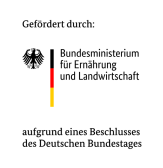The joint project "Stadt-Land-Flussr" (data and AI-supported development and strengthening of value chains in the field of regional food systems), SLF for short, investigates the strengthening of the regional food system by building digital data platforms for economic and nutritional data with artificial intelligence methods. Consumers want more regional products and more transparency when shopping. Regional producers, on the other hand, need more information on the needs and purchasing behaviour of their customers. In order to improve the supply of regional food and strengthen the regional economy, transparency is to be created in the project along food value chains. This should lead to greater sustainability and efficiency in the long term. Consumers, suppliers and producers will be networked via a prototypical, digital, interoperable, transferable and scalable platform for nutritional data in the Berlin-Brandenburg region, thus compensating supply and demand. The regional aspect is of particular concern to the project partners: the region, municipalities and consumers are to be involved. The need and desire to make the current food system more sustainable with the help of digital innovation is the motivation of the project. This transformation depends, among other things, on the availability of a reliable database, which is currently lacking. Key to managing regional food systems is the availability of high-quality spatial and temporal data, which should be collected at the local level. In order to make this possible, central questions must be clarified: What are the relevant scenarios for the initial development of a regional food system? Where do social actors get analysis results on the sustainability of value chains, regional production potential and the level of supply? Where can consumers purchase their products not only according to quantity, price and quality, but also according to sustainability criteria? How can companies along regional value chains meet the additional information requirements with little additional effort and generate added value from them? How should supply chains be optimised? DFKI participates with the Berlin team of the research area Cognitive Assistance Systems primarily in the field of AI-supported user interfaces for all users. Another area is AI-based methods in the data and service ecosystem, e.B. for decision support.
Partners
- Fraunhofer Institut für offenen Kommunikationssysteme FOKUS (Koordinator)
- Hochschule für nachhaltige Entwicklung Eberswalde
- Technische Universität Berlin
- GHS GRUBER & HUFNAGEL Softwareentwicklung GmbH
- Pielers GmbH
- pro agro - Verband zur Förderung des ländlichen Raumes in der Region Brandenburg-Berlin e.V.
- Verband der Software-, Informations- und Kommunikations-Industrie in Berlin und Bran-denburg e.V. (SIBB)
- Terra Naturkost Handels KG
- Lienig Wildfruchtverarbeitung GmbH


